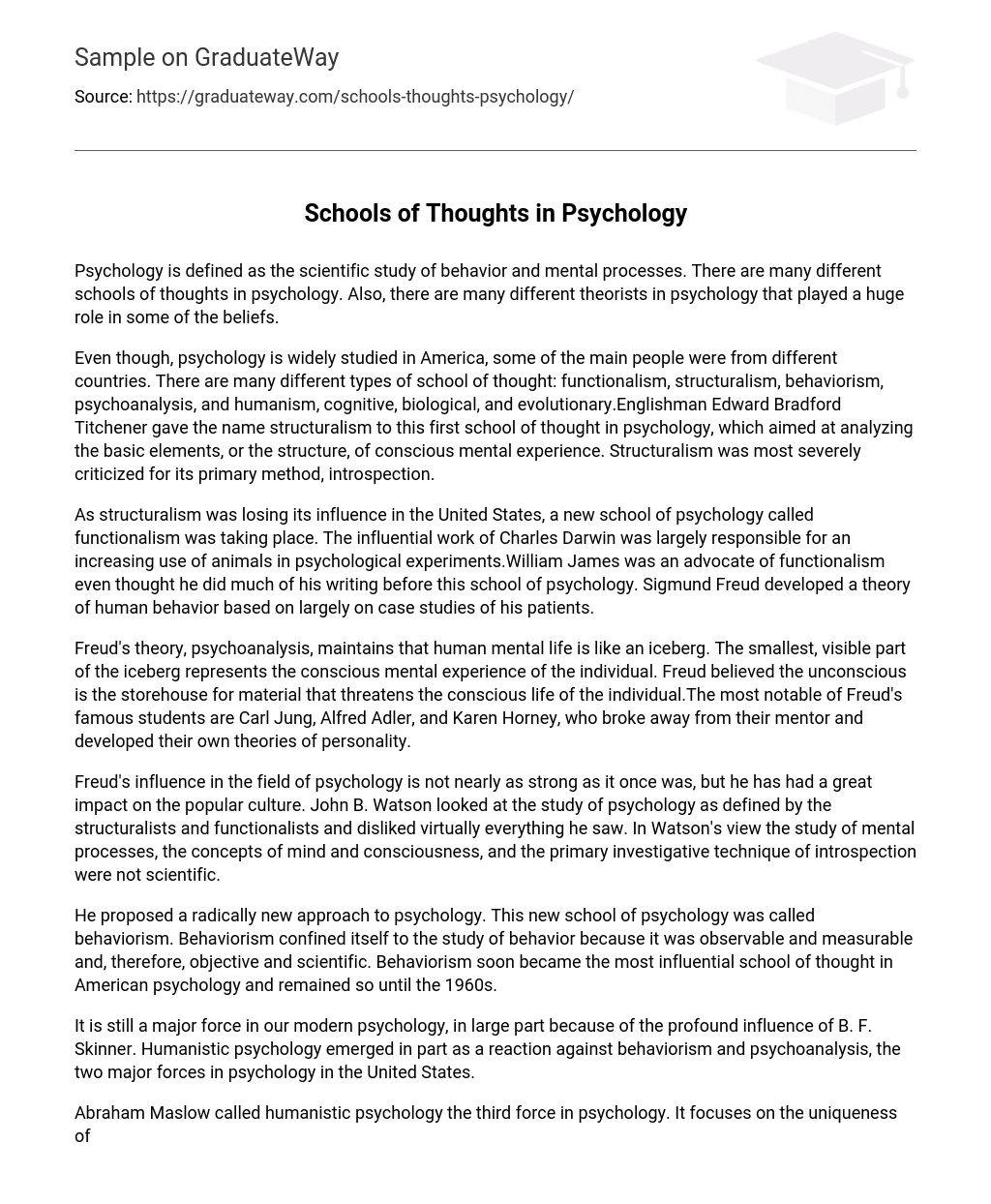Psychology is defined as the scientific study of behavior and mental processes. There are many different schools of thoughts in psychology. Also, there are many different theorists in psychology that played a huge role in some of the beliefs.
Even though, psychology is widely studied in America, some of the main people were from different countries. There are many different types of school of thought: functionalism, structuralism, behaviorism, psychoanalysis, and humanism, cognitive, biological, and evolutionary.Englishman Edward Bradford Titchener gave the name structuralism to this first school of thought in psychology, which aimed at analyzing the basic elements, or the structure, of conscious mental experience. Structuralism was most severely criticized for its primary method, introspection.
As structuralism was losing its influence in the United States, a new school of psychology called functionalism was taking place. The influential work of Charles Darwin was largely responsible for an increasing use of animals in psychological experiments.William James was an advocate of functionalism even thought he did much of his writing before this school of psychology. Sigmund Freud developed a theory of human behavior based on largely on case studies of his patients.
Freud’s theory, psychoanalysis, maintains that human mental life is like an iceberg. The smallest, visible part of the iceberg represents the conscious mental experience of the individual. Freud believed the unconscious is the storehouse for material that threatens the conscious life of the individual.The most notable of Freud’s famous students are Carl Jung, Alfred Adler, and Karen Horney, who broke away from their mentor and developed their own theories of personality.
Freud’s influence in the field of psychology is not nearly as strong as it once was, but he has had a great impact on the popular culture. John B. Watson looked at the study of psychology as defined by the structuralists and functionalists and disliked virtually everything he saw. In Watson’s view the study of mental processes, the concepts of mind and consciousness, and the primary investigative technique of introspection were not scientific.
He proposed a radically new approach to psychology. This new school of psychology was called behaviorism. Behaviorism confined itself to the study of behavior because it was observable and measurable and, therefore, objective and scientific. Behaviorism soon became the most influential school of thought in American psychology and remained so until the 1960s.
It is still a major force in our modern psychology, in large part because of the profound influence of B. F. Skinner. Humanistic psychology emerged in part as a reaction against behaviorism and psychoanalysis, the two major forces in psychology in the United States.
Abraham Maslow called humanistic psychology the third force in psychology. It focuses on the uniqueness of human beings and their capacity for choice, growth, and psychological health. Humanists rejected the behaviorist notion that people have no free will and are shaped and controlled strictly by the environment. Humanists also rejected Freud’s theory that people are determined and driven from within, acting and marching to the dark drums of unconscious.
Cognitive psychology is a specialty that focuses on mental processes such as memory, problem solving, concept formation, reasoning and decision-making, language, and perception.They see humans not as passive recipients who are pushed and pulled by environmental forces, but as active participants who seek out experiences, who alter and shape them, and who use mental processes to transform information into their own cognitive development. Jean Plaget, Noam Chomsky and Herbert Simon were the key people for this school of thought. Psychologists who adopt the biological psychology emphasize the role of heredity as the key to understanding behavior and thinking.
Biologically oriented psychologists study the structures of the brain and central nervous system, the functioning of the neurons, the delicate balance of neurotransmitters and hormones. Key people of biological psychology included: James Olds, Roger Sperry, David Hubel, and Torsten Wiesel. The evolutionary psychology focuses on how humans have evolved and adapted behaviors required for survival in the face of various environmental pressures over the long course of evolution. Evolutionary psychologists study how inherited tendencies and dispositions in humans influence a wide range of behaviors.
But most evolutionary psychologists recognize that genes alone do not control an individual’s ultimate destiny. Evolutionary psychology was studied by: David Buss, Martin Daly, Margo Wilson, Leda Cosmides, and John Tooby. Psychology is a topic in a class of its own. Psychology is still studied throughout this world.
The most conducted research is in the United States. The way of thinking in psychology is getting better with the development of the new technology and other similar things. These different schools of thought will not be forgotten.





